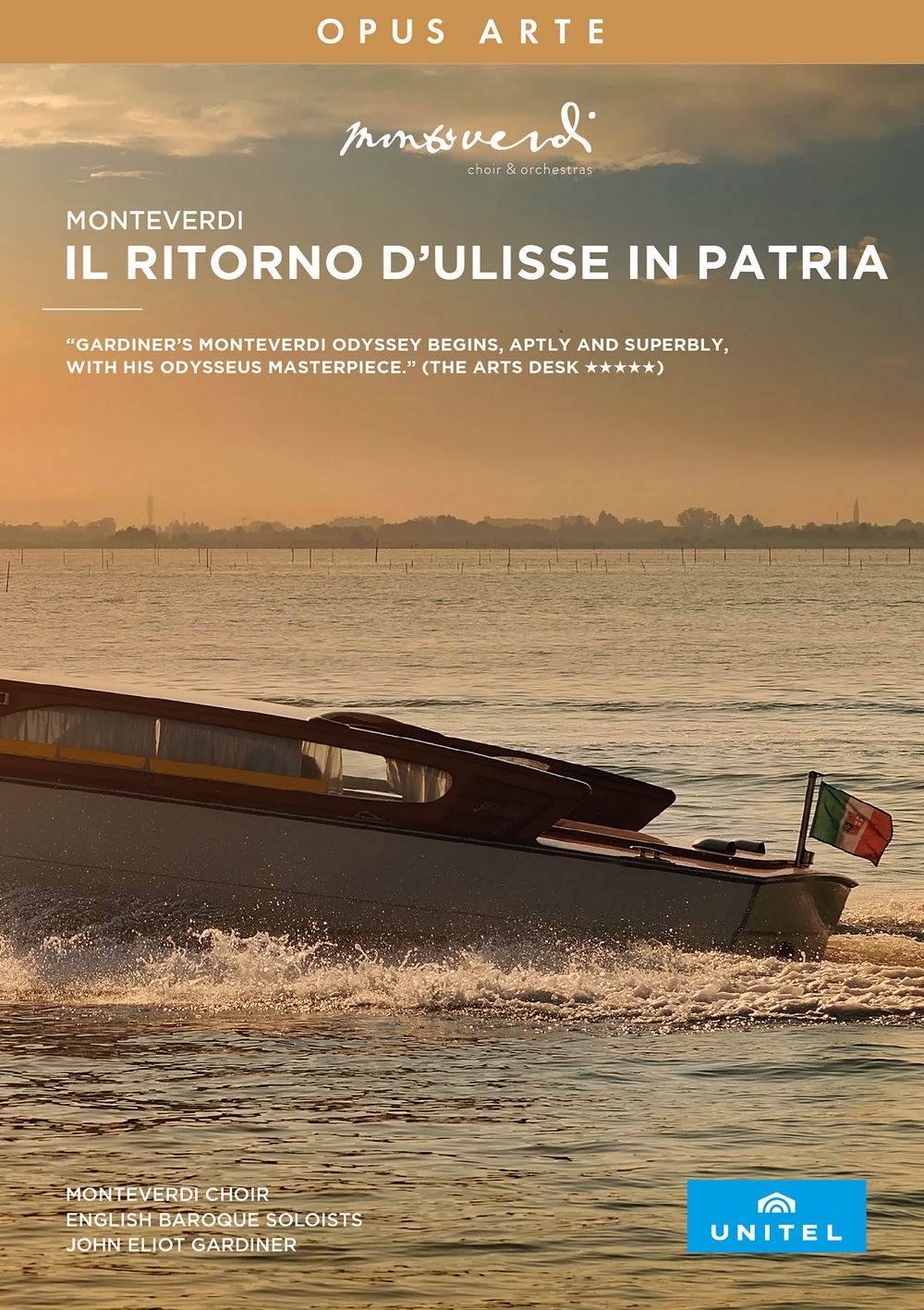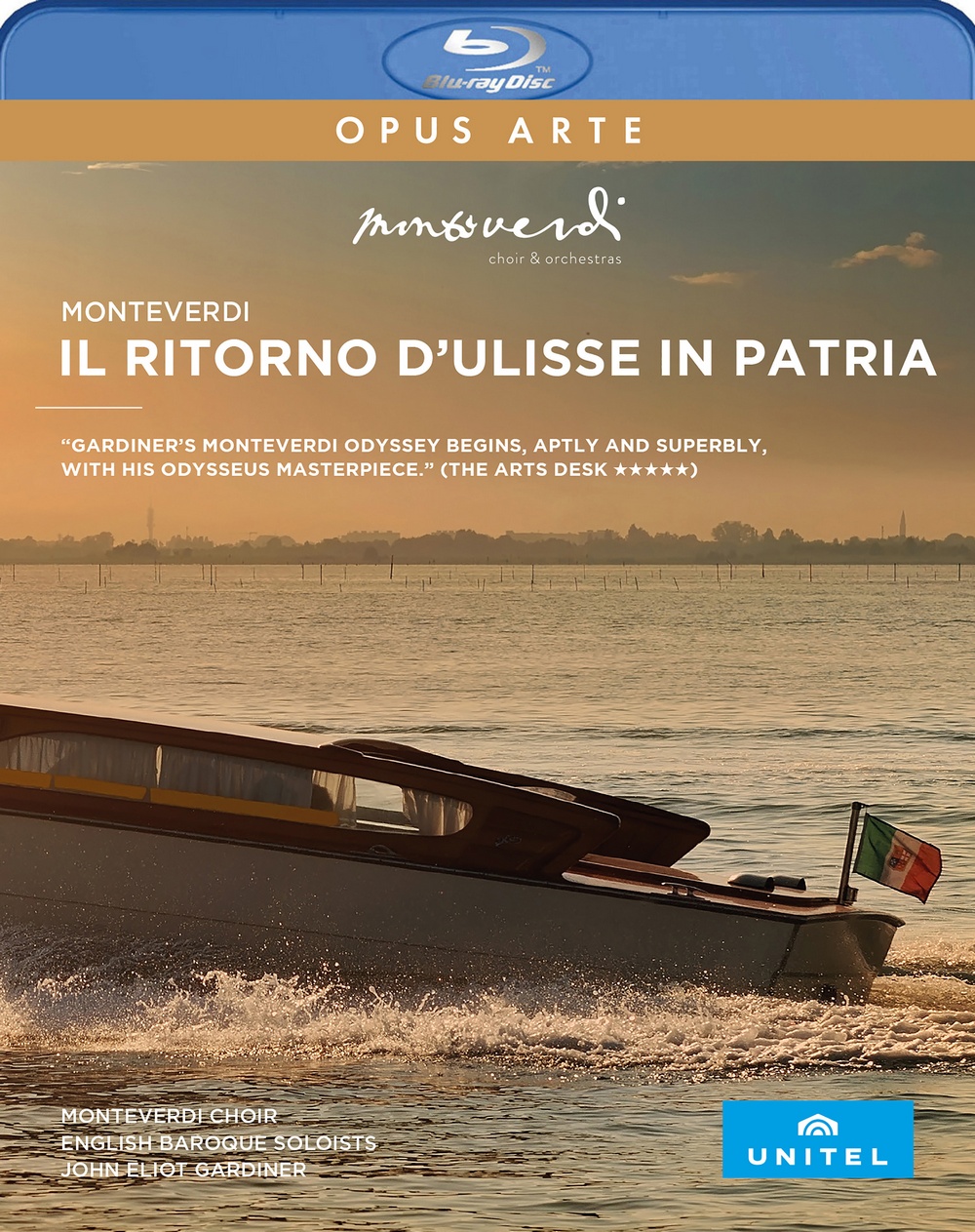Hana Blažíková (Fortuna/Minerva); Krystian Adam (Telemaco); Furio Zanasi (Ulisse); Lucile Richardot (Penelope); Michał Czerniawski (Pisandro); Gareth Treseder (Anfinomo); Gianluca Buratto (Tempo/Nettuno/Antinoo); Zachary Wilder (Eurimaco)
Claudio Monteverdi was a pioneer in the origins and development of opera, taking vocal music beyond Renaissance polyphony and entering a modern era in which genuine feelings and emotions are expressed through a wide variety of characters. Part of a late flowering in Monteverdi’s illustrious career, Il ritorno d’Ulisse in patria is considered the most tender and moving of his three surviving operas. It takes its narrative from the second half of Homer’s Odyssey, presenting Ulysses as a flawed hero; a lone wanderer who has to overcome cruel tests, terrible hardships, treachery and deception before he can be reunited with his faithful queen Penelope and recover his kingdom. Recorded in Venice’s historical Teatro La Fenice, this semi-staged production is part of John Eliot Gardiner’s acclaimed celebration of Monteverdi’s 450th anniversary, a true milestone in Western cultural history.
DVD
BLU-RAY
John Eliot Gardiner
English Baroque Soloists; Monteverdi Choir
Hana Blažíková; Krystian Adam; Furio Zanasi; Lucile Richardot; Michał Czerniawski; Gareth Treseder; Gianluca Buratto; Zachary Wilder; English Baroque Soloists; Monteverdi Choir; John Eliot Gardiner
Those who have been fortunate enough to hear all of these performances will have seen how Gardiner’s hand-picked lineup of soloists has been knitted into a real company, with many of the singers taking roles in all three operas.
Binding it together was Gardiner, knowing exactly when to allow the drama to unfold naturally, when to give it an extra push and how to give the ceremonial moments, with cornetti and sackbuts to the fore, regal and magical power. Played straight through, without an interval, it was all magically coherent, every phrase totally memorable.
John Eliot Gardiner’s ad-hoc company of impressive singers and musicians shine in a beautifully realised semi-staging that sounded totally assured... Every element in this show, you sense, has been carefully thought out and beautifully realised.
...they capture very well the uncomplicated power of these modern-dress concert stagings, directed by Gardiner and Elsa Rooke, with a troupe of singers who take on roles in each of the operas. It's the dramatic power of Monteverdi's music that comes through most strongly, exactly as it should." (The Guardian ★★★★★)
"Gardiner’s Monteverdi Odyssey begins, aptly and superbly, with his Odysseus masterpiece
Gardiner’s Ritorno showed that, on the contrary, his style of recitative, constantly in motion between a sort of dry chatter and informal lyrical song, with every shade in between, is probably the most sophisticated form of word-setting known to man.
The playing by the English Baroque Soloists seemed to me nearly flawless, and I liked very much Rooke’s discreet but poised use of the quite limited Colston Hall platform." (The Arts Desk ★★★★★)
"John Eliot Gardiner made a triumphant start to a year-long celebration of Monteverdi’s 450th anniversary
It already looks as if it will be the unmissable event of this Monteverdi year
In gorgeous aubergine silk, with a voice to match, Lucile Richardot made a wonderfully imploring and dignified Penelope. Furio Zanasi was her vivid Ulisse; he makes everything he sings sound as natural as speech.
Elsewhere, Anna Dennis was a stand-out Melanto, radiant, flirtatious and totally in control, and Krystian Adam gave a well-judged portrait of Telemaco. The choir added a touch of heavenly polish" (The Times ★★★★★)
"Lucile Richardot (Penelope), Krystian Adam (their son Telemaco) and Hana Blažíková (Minerva), all previously heard in Orfeo, bring nuance as much to the recitative as the arioso passages, guided by Gardiner's sensitivity and sympathetic accompaniment by the English Baroque Soloists" (British Theatre Guide)
"Gardiner and Rooke’s conception for Ulisse is simple, direct and subtle. Richardot captures Penelope’s loneliness and constrained emotions… Furio Zanasi is a world-weary yet dignified Ulisse, humble during his meeting with Blažíková’s alert Minerva, and quietly confident during his homecoming trials" (Gramophone Awards 2022)
Hana Blažíková (Fortuna/Minerva); Krystian Adam (Telemaco); Furio Zanasi (Ulisse); Lucile Richardot (Penelope); Michał Czerniawski (Pisandro); Gareth Treseder (Anfinomo); Gianluca Buratto (Tempo/Nettuno/Antinoo); Zachary Wilder (Eurimaco)
Claudio Monteverdi was a pioneer in the origins and development of opera, taking vocal music beyond Renaissance polyphony and entering a modern era in which genuine feelings and emotions are expressed through a wide variety of characters. Part of a late flowering in Monteverdi’s illustrious career, Il ritorno d’Ulisse in patria is considered the most tender and moving of his three surviving operas. It takes its narrative from the second half of Homer’s Odyssey, presenting Ulysses as a flawed hero; a lone wanderer who has to overcome cruel tests, terrible hardships, treachery and deception before he can be reunited with his faithful queen Penelope and recover his kingdom. Recorded in Venice’s historical Teatro La Fenice, this semi-staged production is part of John Eliot Gardiner’s acclaimed celebration of Monteverdi’s 450th anniversary, a true milestone in Western cultural history.
DVD
BLU-RAY
John Eliot Gardiner
English Baroque Soloists; Monteverdi Choir
Hana Blažíková; Krystian Adam; Furio Zanasi; Lucile Richardot; Michał Czerniawski; Gareth Treseder; Gianluca Buratto; Zachary Wilder; English Baroque Soloists; Monteverdi Choir; John Eliot Gardiner
Those who have been fortunate enough to hear all of these performances will have seen how Gardiner’s hand-picked lineup of soloists has been knitted into a real company, with many of the singers taking roles in all three operas.
Binding it together was Gardiner, knowing exactly when to allow the drama to unfold naturally, when to give it an extra push and how to give the ceremonial moments, with cornetti and sackbuts to the fore, regal and magical power. Played straight through, without an interval, it was all magically coherent, every phrase totally memorable.
John Eliot Gardiner’s ad-hoc company of impressive singers and musicians shine in a beautifully realised semi-staging that sounded totally assured... Every element in this show, you sense, has been carefully thought out and beautifully realised.
...they capture very well the uncomplicated power of these modern-dress concert stagings, directed by Gardiner and Elsa Rooke, with a troupe of singers who take on roles in each of the operas. It's the dramatic power of Monteverdi's music that comes through most strongly, exactly as it should." (The Guardian ★★★★★)
"Gardiner’s Monteverdi Odyssey begins, aptly and superbly, with his Odysseus masterpiece
Gardiner’s Ritorno showed that, on the contrary, his style of recitative, constantly in motion between a sort of dry chatter and informal lyrical song, with every shade in between, is probably the most sophisticated form of word-setting known to man.
The playing by the English Baroque Soloists seemed to me nearly flawless, and I liked very much Rooke’s discreet but poised use of the quite limited Colston Hall platform." (The Arts Desk ★★★★★)
"John Eliot Gardiner made a triumphant start to a year-long celebration of Monteverdi’s 450th anniversary
It already looks as if it will be the unmissable event of this Monteverdi year
In gorgeous aubergine silk, with a voice to match, Lucile Richardot made a wonderfully imploring and dignified Penelope. Furio Zanasi was her vivid Ulisse; he makes everything he sings sound as natural as speech.
Elsewhere, Anna Dennis was a stand-out Melanto, radiant, flirtatious and totally in control, and Krystian Adam gave a well-judged portrait of Telemaco. The choir added a touch of heavenly polish" (The Times ★★★★★)
"Lucile Richardot (Penelope), Krystian Adam (their son Telemaco) and Hana Blažíková (Minerva), all previously heard in Orfeo, bring nuance as much to the recitative as the arioso passages, guided by Gardiner's sensitivity and sympathetic accompaniment by the English Baroque Soloists" (British Theatre Guide)
"Gardiner and Rooke’s conception for Ulisse is simple, direct and subtle. Richardot captures Penelope’s loneliness and constrained emotions… Furio Zanasi is a world-weary yet dignified Ulisse, humble during his meeting with Blažíková’s alert Minerva, and quietly confident during his homecoming trials" (Gramophone Awards 2022)





























